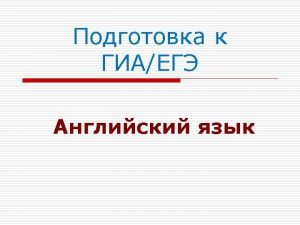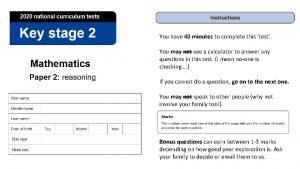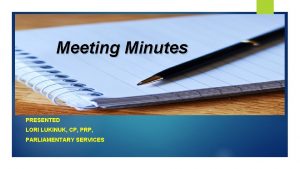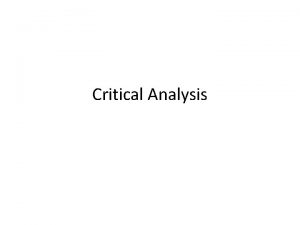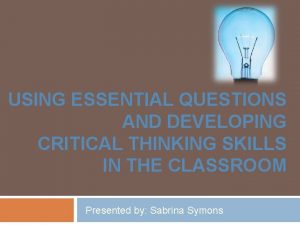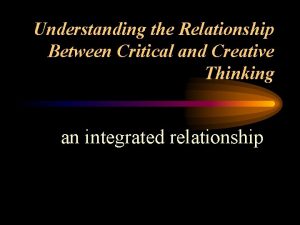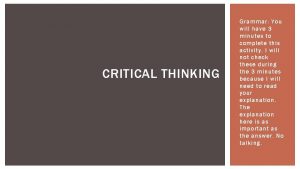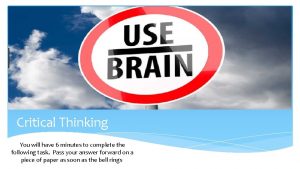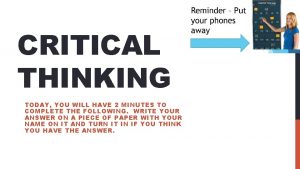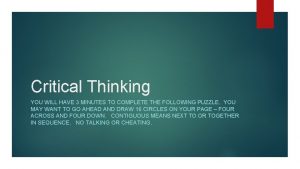Critical Thinking You will have 2 minutes to


















- Slides: 18

Critical Thinking You will have 2 minutes to solve the following puzzle. Bring your answers up to show me prior to time running out. No talking, no cheating!

The Problem Isaac and Albert were excitedly describing the result of the Third Annual International Science Fair Extravaganza in Sweden. There were three contestants, Louis, Rene, and Johannes. Isaac reported that Louis won the fair, while Rene came in second. Albert, on the other hand, reported that Johannes won the fair, while Louis came in second. In fact, neither Isaac nor Albert had given a correct report of the results of the science fair. Each of them had given one correct statement and one false statement. What was the actual placing of the three contestants?

The Answer Johannes won; Rene came in second; Louis came in third. If Isaac had been correct about Louis winning the contest, then Albert would have been wrong with both of his statements – Johannes couldn’t have won because Louis did, and Louis couldn’t have come in second because he won. So, we know that Albert must have been correct about Johannes winning, which means Isaac had to be correct about Rene taking second, and we’re left with Louis in third.

Goals for the Day If given a rhetorical choice and the author’s argument, purpose, or tone, I can explain how the rhetorical choice helps the author develop the overall argument, purpose, and/or tone.

Week 10 – Vocabulary Remember, you’re responsible for studying vocabulary each week. You might want to make flashcards to help you study. Consider making a quizlet – share it with multiple classmates if you’d like. Work together to eliminate work time. Practice a little each day. Vocabulary Quiz #10 will be on Friday. for week 1 -10 words. You are still responsible

Voice Lessons – Tone – Move Left One Seat Consider: It’s his first exposure to Third World passion. He thought only Americans had informed political opinion – other people staged coups out of spite and misery. It’s an unwelcome revelation to him that a reasonably educated and rational man like Ro would die for things that he, Brent, has never heard of and would rather laugh about. Ro was tortured in jail. Franny has taken off her earphones. Electrodes, canes, freezing tanks. He leaves nothing out. Something’s gotten into Ro. Dad looks sick. The meaning of Thanksgiving should not be so explicit. - Bharati Mukherjee, “Orbiting” Discuss: 1. What is the narrator’s attitude toward Brent (Dad)? Cite your evidence. 2. How does the syntax in this passage help create the tone? Apply: Rewrite the last five sentences in the first paragraph, making the five short sentences into two longer sentences, read your rewritten sentences to a partner and discuss how the longer sentences affect the tone of the passage.

Verb Must Be: Parts of a Sentence Look for: Ask: Direct Object Action Subject, Action Verb What? Who? Indirect Object Action Subject, Action To what? Verb, Direct Object For what? To whom? For whom? Objective Complement Action Subject, Action What? Verb, Direct Object Predicate Nominative Linking Subject, Linking Verb Noun? Predicate Adjective Linking Subject, Linking Adjective? Part of Sentence



Open to the Culminating Assignment in Chapter 2 of your book – page 68.

Take your returned essays and your book with you Group 1 Gill Elkins Hart Group 4 Mayes D. Gray Watkins Group 7 Linderman Kinsey Graninger Group 2 Curtis Eberhard Huff Group 5 Ott Huestis K. Powers Group 8 Kellams Mason D. Powers Group 3 Simmons Rorie Burns Group 6 Johnson Steinkuhl P. Gray Group 9 Eckels Smith Ackerman Medlock

Take your returned essays and your book with you Group 1 Group 2 Group 3 Group 4 Bushrod Johnson Norris Miller Abu-Taqa Herrell Lane Sigler Guzman Hubbard Hernandez Rudd Lawrence Stone Group 5 Group 6 Sutton Pease Boyle Stinson Westerfield Bost

SOAPSTone + Argument Briefly discuss the rhetorical situation. Try to really grasp the occasion of this speech in an attempt to better understand JFK’s main argument, tone, and purpose. This is really important – please take it seriously. When time is up, you will be asked to explain not only what you think JFK’s argument, tone, and purpose are but also how they help to create a really cohesive argument.

Small Group Debriefing Now that you have heard each group’s assessment of tone, purpose, and main argument, take 3 -4 minutes to discuss whether your opinions have changed, and if so, how? Then, again, discuss how Kennedy created cohesion (how do they work together) among the tone, purpose, and argument and how the rhetorical strategies he used helped him to develop a cohesive argument. You might consider taking notes and beginning to organize your thoughts to help you prepare for the writing of your essay.

Example: Abstract Diction John F. Kennedy uses a variety of abstract diction to help set the tone of the speech. In any political situation, there will be differences of opinion. Kennedy clearly understands this, so he uses abstract words that have positive connotations for everyone, not just a single group. Regardless of political affiliation, race, ethnicity, religion, or gender “freedom” is something we can all rally around. Everyone respects “devotion” and “loyalty” so using these types of words help him to develop a unifying tone. Even when he shifts to words with negative connotations such as “poverty, ” he uses them to create unity. No one wants to live in poverty or see others live in poverty, so if he can give the impression that we can reduce or eliminate poverty, he hopes nearly all people will rally behind this. His unifying tone is critical to his overall argument as well. His goal is to convince not just the United States but the entire world that the values and beliefs, the freedoms and rights, that our country were built on can be replicated around the globe. But, this cannot be done alone. It will take everyone working together to achieve it, so he must find a way to unify or rally the people of the world toward this single cause. By using abstract diction, he takes his first step toward unifying everyone. Interestingly, these abstract words also help him set a fairly formal tone, which people around the world are also looking for. The abstract words are appropriate to the occasion of a new president of the United States taking office. But, even as one of the most powerful men in the world, he expresses that he will have to make “sacrifices” just as the people will. Knowing that your leader is willing to sacrifice goes a long way in persuading others to sacrifice, so once again, this abstract diction helps to unify people around the globe which is critical to his overall argument.

The Task and The Expectations Each group will have 15 minutes to discuss the following information and answer write a rhetorical analysis body paragraph. 1. Clarify last misunderstanding about the main argument, purpose, and tone of JFK’s speech. 2. Identify the where you see the first rhetorical strategy I give you. Discuss what it is, where you can find it in the speech, and what effect it creates. 3. Discuss how your rhetorical strategies helped JFK to develop either his argument, purpose, or tone. 4. Write a rhetorical analysis body paragraph – consider working together to write it really well OR writing it individually and then determining the best. Write this as if the best group is going to get a 100%, the second best is going to get a 90%, etc.

Homework 1. Complete the Parts of a Sentence review sheets and come with any questions you have about parts of a sentence on Wednesday (possible quiz on Friday). 2. Read about Understatement in your Rhetorical Device book. Highlight the text as needed. Add Understatement information to your rhetorical device log, and then complete the understatement exercises in the book. Bring your rhetorical device book to class on Friday – I will be collecting them and grading all of the exercises you’ve done so far (hypophora, rhetorical question, hyperbole, and understatement). 3. Complete the Voice Lessons – our last Tone Voice Lesson will be on Friday, so we will be collecting all 5 Voice Lessons on Friday. Be sure you have them all and they are complete. IF you were absent, go back to the Weebly page and get them from the slides. 4. Don’t forget you have an Albert Assignment Due Tonight! Me. The Stranger in the Photo is

Your Prompt Read John F. Kennedy’s inaugural address given on January 20, 1961. In a wellorganized essay, analyze how Kennedy’s use of various rhetorical strategies help him to create cohesion among his tone, purpose, and main argument. Initially write this essay as if it were a timed 40 minute essay, but then revise and edit it in an effort to receive an AP essay score of a 9. Remember that a score of a 9 is not based on how long the essay is but rather how well you get your points across and how well you are able to control the language with your writing.
 Critical semi critical and non critical instruments
Critical semi critical and non critical instruments Semi-critical
Semi-critical Perbedaan critical thinking dan creative thinking
Perbedaan critical thinking dan creative thinking Why are there 60 seconds in a minute and not 100
Why are there 60 seconds in a minute and not 100 What language
What language You have 30 minutes to do this task
You have 30 minutes to do this task You have 20 minutes to do this task
You have 20 minutes to do this task You have 20 minutes to do this task
You have 20 minutes to do this task Only 10 minutes left
Only 10 minutes left You will have 40 minutes to complete the test.
You will have 40 minutes to complete the test. Thinking about you thinking about me
Thinking about you thinking about me Because you have rejected me i have rejected you
Because you have rejected me i have rejected you 8 triangular faces
8 triangular faces Do meeting minutes have to be approved
Do meeting minutes have to be approved Slidetodoc.com
Slidetodoc.com Which is the hardest
Which is the hardest Critical thinking guidelines
Critical thinking guidelines Critical thinking examples
Critical thinking examples Relationship between critical and creative thinking
Relationship between critical and creative thinking





